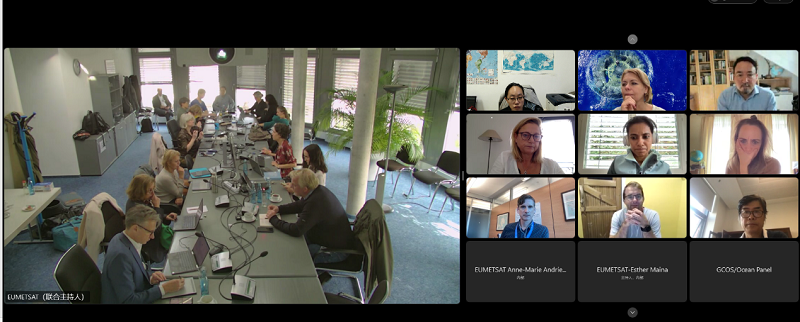CLIVAR participated in OOPC-25

The Ocean Observations Physics and Climate Panel (OOPC), co-sponsored by the Global Climate Observing System (GCOS), Global Ocean Observing System (GOOS) and World Climate Research Programme (WCRP), organized its 25th meeting at EUMETSAT, UK in-person and also online from 20 to 21 October 2022. The meeting was chaired by Sabrina Speich and Belén Martín Míguez from OOPC, with the representatives from GCOS, GOOS, WCRP and CLIVAR IORP, ARP, GSOP, NORP and ICPO. The meeting focused on defining the role of OOPC and connections to other bodies including WCRP and CLIVAR.
Dr. Birgit Gaye presented recent the activities of IORP, including the Western Indian Ocean Workshop, the IndOOS-2 implementation tracking including assessing the impacts on IndOOS-2, the new focused activities on marine heatwave (MHW), along with PRP and ARP, as well as the early career scientists and Indian Ocean Youth Ambassadors initiative.
Dr. Regina R. Rodrigues presented the WCRP Lighthouse Activity on My Climate Risk (MCR) and the recent updates from ARP, including the Ocean Extreme Working Group within ARP, which has the potential to become a MCR hub. Ms. Jing Li from ICPO added that the CLIVAR Exchanges special issue on the Tropical Atlantic Observing System (TAOS) is being prepared, by synthesizing the key outcomes from the TAOS Review Report. In addition, the CLIVAR AMOC Task Team is preparing a workshop to assess the observation gaps of AMOC.
Dr. Peter Oke briefly introduced the Global Synthesis and Observations Panel (GSOP) of CLIVAR, including its members and expertise, research interests, as well as the two joint activities: 1) How does data assimilation of observations impact dynamical balance of model? 2) What metrics are most suitable for assessing data assimilating systems?
Dr. Benjamin Rabe reported the key activities organized by NORP in 2022, which include the Arctic Processes CMIP bootcamp, NORP-SORP Workshop on Polar Fresh Water, and open call for CLIVAR new members.
Dr. Weidong Yu, co-chair of OOPC briefly introduced the CLIVAR-GOOS From Global to Coastal Workshop organized on 15-17 August 2022, with the highlights on three important aspects: 1) academic partnership; 2) low cost and innovative technologies; and 3) stakeholder co-design. The truly pan-tropical oceans observing system integrating the TPOS, TAOS and tropical components of IndOOS was promoted from the workshop, by listening to the observation needs from developing countries and identifying the coastal observational gaps. This may be under the umbrella of GOOS.
The major uptakes from the discussions are:
- Strengthened cooperation between WCRP/CLIVAR and OOPC through building formal links was reiterated during the meeting.
- More links can be pursuit through broader WCRP community, besides CLIVAR, there are also potential opportunities to collaborate with the new core project (ESMO) and other lighthouse activities of WCRP;
- To strengthen the cooperation with three UN Ocean Decade Programmes coordinated by GOOS, i.e. Ocean Observing Co-Design, CoastPredict and Observing Together.
- The marine heatwave related activities were interested by participants. The potential links can be established through:
- CLIVAR Summer School and research foci on MHW.
- Ocean Observing Co-Design exemplar group on Marine Heat Wave.
- Cooperation with the Ocean Indicators Task Team led by Karina von Schuckmann.
- GSOP may further consider assessing the different methods for coupled data assimilation on forecasting systems, by referring to the experiments led by Magdalena Balmaseda (ECMWF) on the impacts of ocean observations in seamless forecasting systems.
- A joint working group by GCOS/GOOS/CLIVAR may be further explored to promote the pan-tropical ocean observing system.











Add new comment